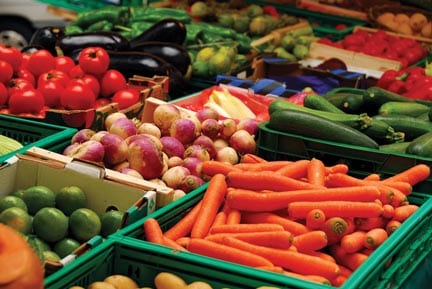
All these factors are clear indicators that spending is down and prices are up, despite what they say. Lesser known “bargain brands” and German stores have had meteoric rise to fame of late and are benefiting from customers willing to chase down the bargain deal of the week. In a non food related comparison, Penney’s staff are furiously running from aisle to shelf to keep the stock on the shop floor as it continues to thrive in these “economically challenged times”
So with that, would now be the time to move to organic foods as such a little price difference now exists? Or does it? Whether you perceive that prices have come up or down, the margin is closing and closing fast.
Habits may never change, but an increasing number of people are choosing organic foods for a variety of reasons – and affordability definitely isn’t one of them!
If you’ve decided to make organic products a part of your life but are worried about blowing your budget, there may be options ahead.
Looking at fruit and vegetables, the top two pesticide offenders when it comes to conventionally grown fruit are peaches and strawberries.
Strawberries are especially pesticide-laden and difficult to wash, so if you can’t find organic, choose another fruit.
Bananas are another chemical offender. They’re sprayed heavily with chemical pesticides while on the tree and treated with a compound called thiabendazole – which is a brain and nervous system disruptor – so they can weather the trip from the tropics around the world.
Also choose organic apples, raspberries, nectarines, grapes, pears and cherries whenever possible.
And if you’re planning to zest your lemons and limes or put them in a drink, always choose the organic version.
When it comes to vegetables, top your organic grocery list with potatoes, corn, carrots, peppers, spinach, celery and cucumbers. And always avoid conventionally grown green beans.
Lower pesticide levels are present in asparagus, avocados, broccoli and cauliflower so only buy these organic if you can.
Baby Food – Babies are especially sensitive to commercial pesticides, so purchase organic baby food when possible. Major baby food manufacturers are currently producing organic versions of their baby food so finding organic baby food is easy. If you make your own baby food, use organic fruits, vegetables and grains whenever possible.
It doesn’t pay to buy organic versions of the following:
Seafood – Farmed or wild fish can be labelled organic regardless of the levels of mercury and PCB’s they contain.
Processed and Packaged Foods – Processed organic foods have little health value because many of the nutrients have been processed right out. And many packaged foods are labelled as “made with organic ingredients” which means only some of the ingredients are organic, so read ingredient labels carefully.
Next week I’ll give you a few tips to going organic without the strangling cost associated.
Also, don’t forget, where possible, choose Irish. We need to support our own.


